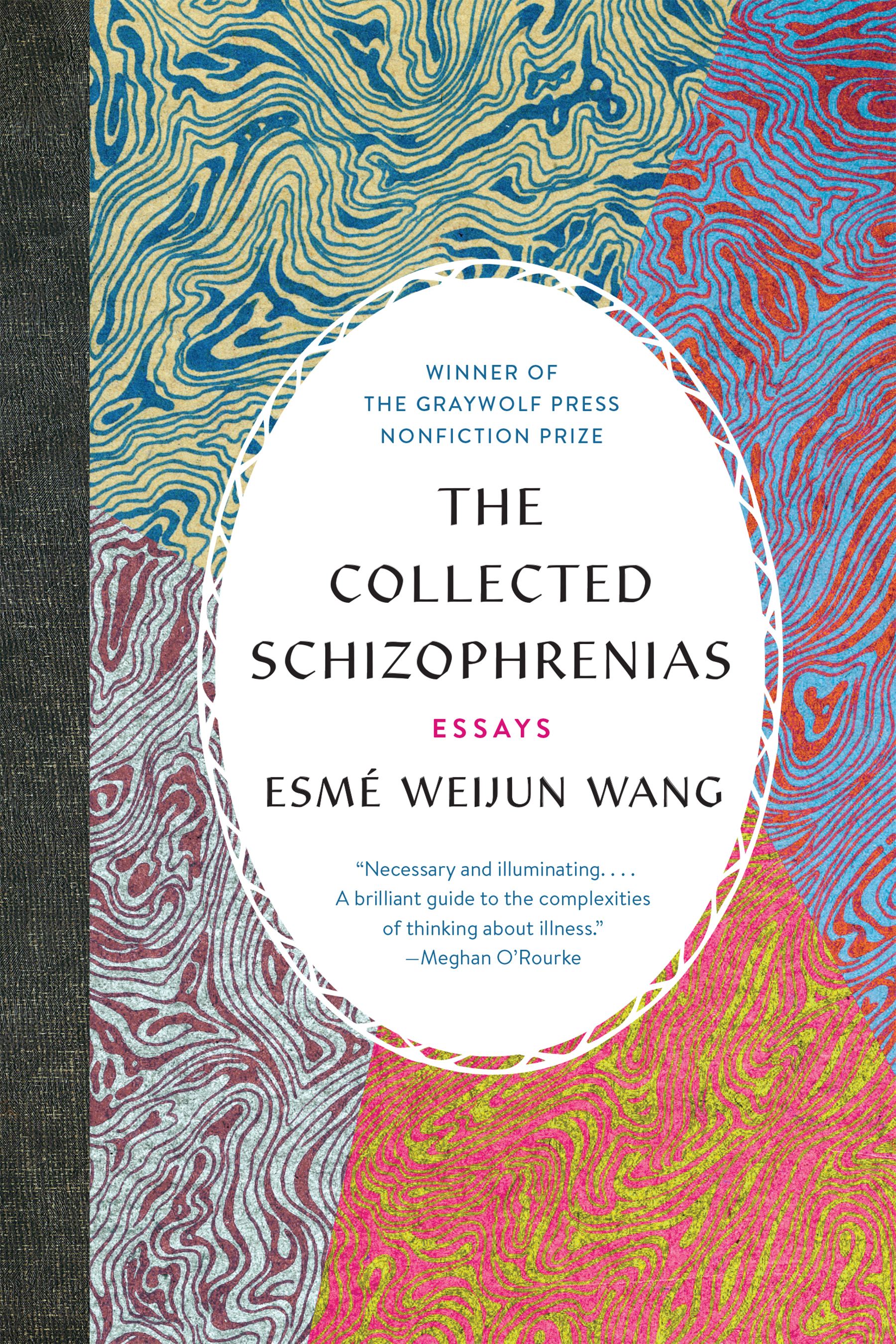When she began writing about mental illness for a public audience, Esmé Weijun Wang sincerely believed she was dead.
In the fall of 2013, the novelist (her debut, The Border of Paradise, was released in 2016) woke up one morning convinced that she was no longer alive. Initially, she was jubilant, convinced she had been given a “second chance” to walk the Earth, but those thoughts soon took a darker turn. Later, she says, she experienced “psychic agony” at the idea that she had been thrust into “perdition.”
Wang was experiencing Cotard’s Delusion, otherwise known as Cotard’s Syndrome, a rare condition that persuades a person he or she does not exist. And though she didn’t consider herself a non-fiction writer, Wang sought an outlet to share the experience, which led her to write a piece about it for The Toast: In the delusion, she writes, “I was doomed to be surrounded by creatures and so-called people that mimicked the lovely world that I’d once known.”
The experience of writing that essay while mired in intermittent psychosis, she says now, was “therapeutic.” So Wang began to write more essays, even as she completed The Border of Paradise and won a 2018 Whiting Award for non-fiction. Now, some of those essays are gathered alongside new ones in The Collected Schizophrenias, which comprises Wang’s writing about her longtime struggles with mental illness—she has been diagnosed with schizoaffective disorder, late-stage Lyme disease, and post-traumatic stress disorder—and how these struggles have shaped her and her view of the world. In this slim collection, the author describes her troubled relationship with fantasy entertainment, which can prompt her to lose grasp of reality, with reference to the 2014 Scarlett Johansson thriller Lucy; draws connections between her diagnosis and her tendency to dress and present herself carefully (“I can dress and daub when psychotic and not psychotic,” she writes); and examines the most recent research on the connections between autoimmune disorders and mental illnesses.
Throughout the collection, Wang says, she aimed to impart the “visceral” experience of a hallucination or delusion to all readers, whether they’re familiar with schizophrenia or not. “Some of the parts that I’m proudest of in this book are the very amorphous descriptions of how terrifying it feels to go through psychosis,” Wang says. “I think those are things that you can’t get in academic or clinical literature—the sense of fear, terror, or lost-ness—all these things that I had never seen written about before.”
Wang spoke with Pacific Standard about the current literature on schizophrenia and how her collection is different, the value of documenting mental illness in a literary form, and why she “wouldn’t be surprised” if she never wrote another non-fiction book again.

What are some of the tropes you see in the literature about schizophrenia, and what were you trying to do that was different?
My issue with books that are written about the schizophrenias is an issue that happens often with books about marginalized groups in general, in particular marginalized groups with some form of disability. It often happens that it will be a relative of a person with a disability who writes the book, and the voice of the person who actually has the disability kind of gets lost. I’ve read so many books by people with a relative who has some form of mental illness. I’m not saying that’s a story that shouldn’t be told, but I am saying that that’s a story that’s being told a lot.
In the last year or so, as I was coming close to finishing my book, this big book came out by Ron Powers, who won a Pulitzer. I knew it was going to be about schizophrenia and I was so nervous because I was like, wow, this big-shot is coming out with this book about schizophrenia and what if his book renders my book useless? So I bought it and read it, and like 50 pages in, I was just like, I have nothing to worry about, this is nothing like what I’m doing. He’s writing about his son, who has schizophrenia, and it’s the same old thing. I’m not trying to malign Ron Powers for his right to write a giant book about being a father of someone with schizophrenia, but it’s also kind of the same old story. I just want more stories from people who are actually living with the schizophrenias.

(Photo: Kristin Cofer)
The essays in this collection are at once deeply personal and also reported, like magazine stories. Why did you take that approach?
For some reason, when I started writing the book, even though “Perdition Days” is fairly memoiristic, I felt very allergic to the idea of writing a memoir. I don’t have anything against memoirs; I like to read memoirs, I think that some memoirs are really brilliant. But I had this idea of what a memoir about my life with schizoaffective disorder would look like that really didn’t appeal to me. And then also I was really bored by the idea of just focusing on myself: I really wanted to use myself as a jumping-off point and maybe touch back on myself, but then explore other people’s lives, explore the science behind the schizophrenias, explore the way pop culture talks about the schizophrenias.
One book that was very influential to me in writing this was The Noonday Demon. I mean, it’s such a different book; it’s by Andrew Solomon and it’s a huge tome about depression. What I really liked about the book, and still do like about it, is how Solomon talks about all kinds of things that he’s researched and reported, goes into the science of depression and dips in and out of many aspects of clinical depression, [but] he always goes back to his own experiences of depression. I find that very grounding in his story. I think that book is brilliant. I do take umbrage with his depiction of schizophrenia in another book he wrote, Far From the Tree, in my book, but that’s a different topic.
A persistent theme in the book is your lifelong academic and literary ambition. Why was it important to include these details of your personality?
I wanted to include that because my sense of being an overachiever has always been very inextricably tied with my identity as someone with a severe mental illness. I find that, as someone with various forms of disability—and other forms of marginalization, but I’ll just stick with the disability aspect for now—that I’ve often used those things (those things being Yale [University], or the way I dress, or my [grade point average] in high school or college, or my productivity) as shields to help defend myself against the way people might perceive me when they learn about my diagnosis. Because the diagnosis of schizoaffective disorder or of any form of the schizophrenias can be so extreme, it starts you with a really large handicap, to speak in sports terms. If I meet someone or if someone hears about me and all they know about me is my diagnosis, they’re not going to think much of me. It’s not until I start defending myself, so to speak, with all my accomplishments, that I start to gain more social capital. And maybe that’s paranoid, maybe that’s not true at all, but I think that’s the case.
You write about the difficulty of watching and reading fiction while ill, or experiencing symptoms that may portend illness, in “Reality, On-Screen.” Has illness also changed the way you write fiction?

(Photo: Graywolf Press)
That’s a really interesting question; I actually had not thought about that until you just asked that. I don’t lose my sense of reality when I write fiction, whereas I do when I consume fiction or cinema or television, as I explain in that essay. My guess as to why that might be is that I have more control over the fictional world when I’m the one creating it. Fiction is definitely my first love. After I finished writing The Collected Schizophrenias, after we finished editing and copy-editing and everything and it was sent to the printers, I couldn’t do anything more with it, I was just so relieved to be able to work on fiction again, and I’m working on a second novel now.
It’s just such a joy, I love it so much. I wouldn’t be surprised if I never wrote another non-fiction book again. But yeah, there is something really wonderful about being able to be absorbed in a fictional world, and maybe other fictional writers’ experience with writing fiction is the closest they can come to the experience I describe in “Reality, On-Screen.”
What can a literary approach to the schizophrenias do for a reader that a clinical discussion cannot?
What I really wanted to get at with this book, and what I also had wanted to get at with my fiction, was the sense of what severe mental illness—and in particular psychosis and the schizophrenias—was like, in a very visceral manner. That is what is largely missing from an academic perspective and from a more clinical perspective, and that is what I hope that this more literary perspective can give the reader. Some of the parts that I’m proudest of in this book are the very amorphous descriptions of how terrifying it feels to go through psychosis, and how it actually feels in the gut, in a visceral sense, to experience a hallucination or to experience a delusion. Those are things that you can’t get in academic or clinical literature: the sense of fear, terror or lost-ness, all these things that I had never seen written about before.
I really just wanted to get that down on paper so I could try and share it with people that had never experienced it before—and also to share it with people who had experienced it before, and could hopefully feel less alone with their experiences. That is largely my reason for wanting to do this as a more literary project.
Since you’ve been publishing some of the collections’ essays online, have you heard from readers who are living with diagnoses similar to those you describe in the book?
Oh yeah, for sure. I was trying to prepare myself for that, and I have been trying to prepare myself for that, especially since I’m getting ready to go on tour. I’ve been getting many very touching messages from people. Some of the most touching messages I’ve gotten are from people who don’t live with the schizophrenias themselves. One that really stuck with me was from a woman whose father had died that year, and she wrote that he had lived with schizophrenia for a very long time and she had never been able to have a relationship with him or to understand him because of his diagnosis. And she said that, after reading the piece that I had published, that she finally felt like she could start to understand him for the first time. Man, that still really gets me.
This interview has been edited for length and clarity.

Pacific Standard’s Ideas section is your destination for idea-driven features, voracious culture coverage, sharp opinion, and enlightening conversation. Help us shape our ongoing coverage by responding to a short reader survey.





